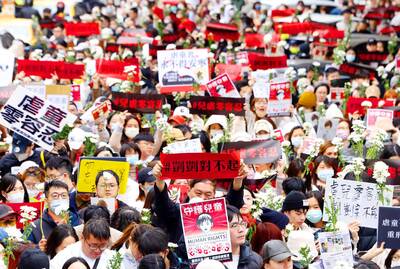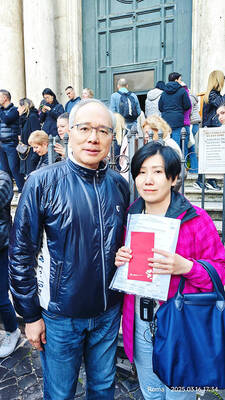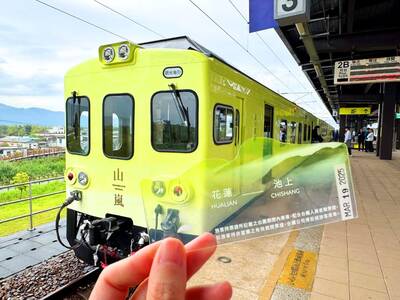After Formosa Television (FTV) secured government approval to coproduce a TV series with a Chinese company, the National Communications Commission (NCC) said yesterday that a series would be considered “made in China” if more than one-third of the cast and crew are Chinese.
Chien Hsu-cheng (簡旭徵), deputy director of the NCC’s Communication Content Department, said that a regulation promulgated by the Ministry of Economic Affairs and the Ministry of Finance last week stipulated criteria for determining the origin of a radio or TV program.
LOCAL CONTENT
The Broadcasting and Television Act (廣播電視法) stipulates that at least 70 percent of programs aired on a terrestrial TV station must be produced in Taiwan.
“If the program has main and supporting actors of a certain country exceeding one-third of the total cast; or if the producers, directors and screenwriters of that country also [make up] the same percentage, it will be considered a production of that country,” Chien said.
The NCC released the statement after the Chinese-language China Times yesterday reported that FTV had coproduced a TV series with a company in Xiamen, Fujian Province.
STARTING WORK
Some of the actors, including Hong Kong actor Adam Cheng (鄭少秋) and other Chinese actors, arrived on Tuesday to begin shooting.
FTV was quoted in the story as saying it had decided to coproduce the series with the Xiamen company because the cultures of Taiwan and Fujian Province have many similarities.
FTV has produced popular series such as Mom’s House (娘家) in Taiwan. Its network offers terrestrial TV service and cable TV service.

Taiwan yesterday condemned the recent increase in Chinese coast guard-escorted fishing vessels operating illegally in waters around the Pratas Islands (Dongsha Islands, 東沙群島) in the South China Sea. Unusually large groupings of Chinese fishing vessels began to appear around the islands on Feb. 15, when at least six motherships and 29 smaller boats were sighted, the Coast Guard Administration (CGA) said in a news release. While CGA vessels were dispatched to expel the Chinese boats, Chinese coast guard ships trespassed into Taiwan’s restricted waters and unsuccessfully attempted to interfere, the CGA said. Due to the provocation, the CGA initiated an operation to increase

A crowd of over 200 people gathered outside the Taipei District Court as two sisters indicted for abusing a 1-year-old boy to death attended a preliminary hearing in the case yesterday afternoon. The crowd held up signs and chanted slogans calling for aggravated penalties in child abuse cases and asking for no bail and “capital punishment.” They also held white flowers in memory of the boy, nicknamed Kai Kai (剴剴), who was allegedly tortured to death by the sisters in December 2023. The boy died four months after being placed in full-time foster care with the

A Taiwanese woman on Sunday was injured by a small piece of masonry that fell from the dome of St Peter’s Basilica in the Vatican during a visit to the church. The tourist, identified as Hsu Yun-chen (許芸禎), was struck on the forehead while she and her tour group were near Michelangelo’s sculpture Pieta. Hsu was rushed to a hospital, the group’s guide to the church, Fu Jing, said yesterday. Hsu was found not to have serious injuries and was able to continue her tour as scheduled, Fu added. Mathew Lee (李世明), Taiwan’s recently retired ambassador to the Holy See, said he met

The Shanlan Express (山嵐號), or “Mountain Mist Express,” is scheduled to launch on April 19 as part of the centennial celebration of the inauguration of the Taitung Line. The tourism express train was renovated from the Taiwan Railway Corp’s EMU500 commuter trains. It has four carriages and a seating capacity of 60 passengers. Lion Travel is arranging railway tours for the express service. Several news outlets were invited to experience the pilot tour on the new express train service, which is to operate between Hualien Railway Station and Chihshang (池上) Railway Station in Taitung County. It would also be the first tourism service